CLP 2024 - Saturday: Plenary | Finale | Business Meeting | Yesterday
YESTERDAY at the Annual Meeting
Insights into development of mind-body healthcare
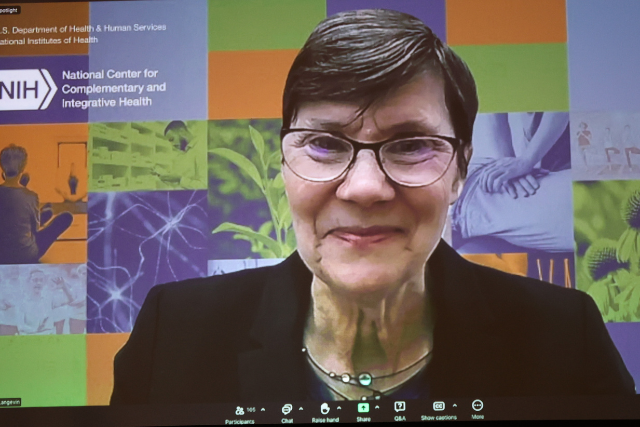
Helene Langevin, MD
The opening plenary—presented by Helene Langevin, MD, director, National Center for Complementary and Integrative Health (NCCIH), National Institutes of Health—provided insights into how modern day mind-brain-body healthcare had its roots in mind-body dualism conceived in the 1500s.
Earlier still, chronicled Persian health care thinking had similar concepts (such as nutritional dietary needs) as does whole person health care today.
In recent times, Interest in whole person healthcare, notably at professional healthcare conferences, has become prevalent. Till now, in the US, diseases have frequently been treated in isolation, after they have arisen. NCCIH, however, is looking to shift the dial—away from predominant focus on individual diseases to a more holistic, integrated perspective where health involves the whole person, and is the product of multiple interconnected factors spanning biological, behavioral, social, and environmental domains.
Placing mental health conditions into the context of whole person healthcare addresses disconnects that patients often experience where co-occurring conditions are treated one at a time, and focus is placed on disease rather than health, says Dr. Langevin.
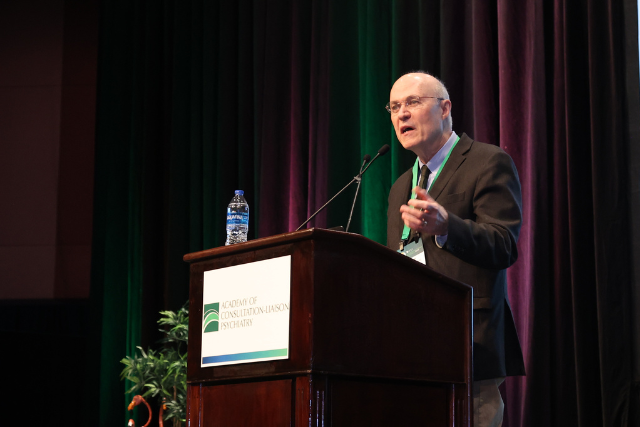
Gregory Fricchione, MD, FACLP
A second plenary was presented by ACLP Eleanor and Thomas P. Hackett Memorial Award winner 2017, Gregory Fricchione, MD, FACLP.
Dr. Fricchione gave an updated view of Engel’s biopsychosocial model, now over 45 years old, and proposed that while Engel was prescient in his argument, the science of the times was preliminary and not robust in support of the premise: “While psychiatrists intuited that the biopsychosocial approach had merit, our colleagues in other specialties for the most part turned a blind eye to its usefulness.”
Medical science of today, buttressed by findings in psychosomatic medicine and neuroimmunology, strengthened the case for a wider and deeper version of the biopsychosocial model.
Dr. Friccione introduced a model of hormetic curves used to define the holarchy of every patient, and which could lend themselves to a mathematical scalar formulation helping to define whole person health.
Sharing thoughts on how mind-body approaches form the foundation of modern healthcare, he adds: “Whole person care recognizes the addition of patient self-care as an essential component of health and well-being to the traditional components of pharmacotherapy and procedures.”
A third plenary yesterday on Mindfulness as a Doorway to Whole Health provided an overview of the evidence-based applications of mindfulness as they relate to C-L Psychiatry and Whole Health, and was followed by a guided mindfulness practice designed to help cultivate the qualities of presence, ease, and compassion, and to foster the development of skilful response to distress and difficulty.
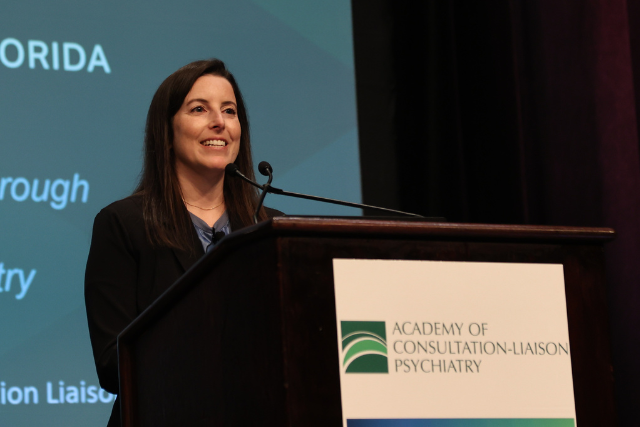
Pamela Mirsky, MD, FACLP
Presenter was Pamela Mirsky, MD, FACLP, assistant professor at University of Arizona.
Diagnostic tool superior to common test
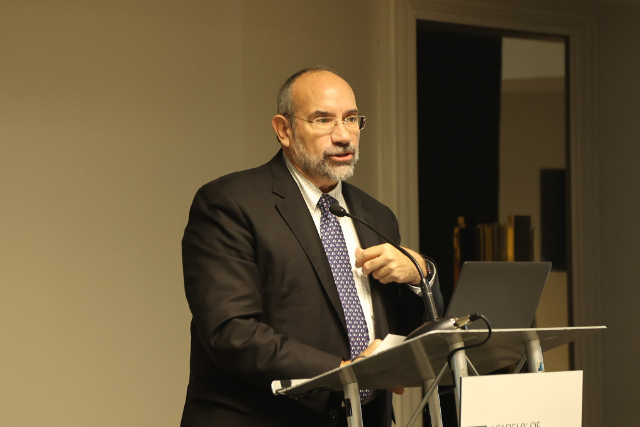
José Maldonado, MD, FACLP, FACFE
Dlin/Fischer Clinical Research Award winner, José Maldonado, MD, FACLP, FACFE, described how his institution’s diagnostic tool to detect delirium has proved superior to a commonly-used test. Read more in the December issue of ACLP News.
Outstanding lifetime achievement
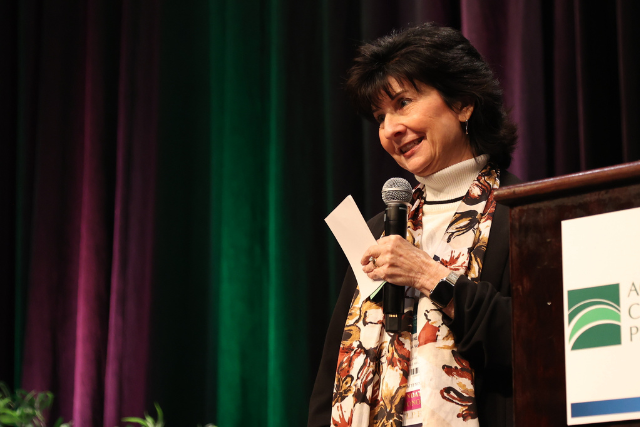
Linda Worley MD, FACLP, DFAPA
This year’s ACLP Eleanor and Thomas P. Hackett Memorial Award winner, Linda Worley MD, FACLP, DFAPA, gave the Hackett Lecture. The Academy’s highest honor is presented to an individual for outstanding achievement in C-L Psychiatry—a member who has demonstrated distinctive achievements in C-L Psychiatry training, research, clinical practice, and leadership.
Plugging mental health treatment gaps
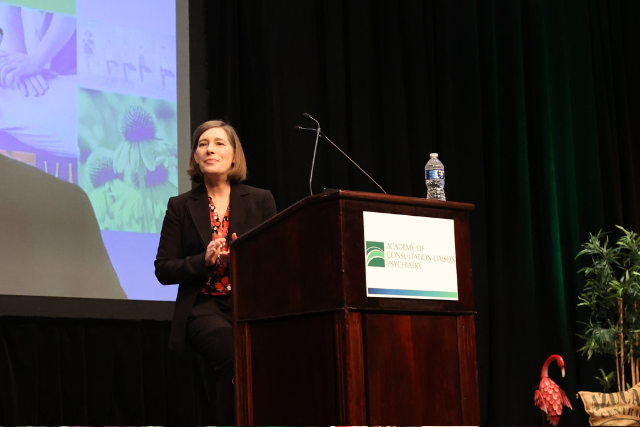
Lydia Chwastiak MD, MPH, FACLP
Nearly a billion people in the world live with a mental disorder. Prevalence estimates are 2-3 times higher among individuals with chronic medical conditions, such as diabetes or HIV. Fewer than half of people with mental disorders receive treatment, leading to huge costs, disability burden, and premature mortality.
Against this background, Lydia Chwastiak MD, MPH, FACLP, University of Washington, set out to explore mental health treatment gaps, particularly among people living in poverty. Gaps were found in the number of people receiving mental health care not being treated to remission; the lack of a holistic approach to clinical complexity; and the lack of mental health care integrated into physical disease programs.
With measurement-based collaborative care models from her own institution in the US—including treatment-specific targets where treatments are intensified until targets are achieved—as her starting point, Dr. Chwastiak set up a 12-month trial in north and south India and soon found that the US model had to be adapted to the local environments. The adapted model used had to:
- Respect family member engagement, like never before.
- Recognise poor literacy, and poor health literacy, at clinics.
- Acknowledge substantial local stigma attached to both depression and diabetes when addressing interventions.
Even so, adapted collaborative care produced superior outcomes among patients compared with standard practice—statistically significant outcomes which, back home in the US, Dr. Chwastiak evaluated—and found measures applicable to models in other low-to-medium income communities, both in the US, and particularly in Ghana and the Dominican Republic.
Her collaborative care package has been tailored to such communities and is currently well into its first phase (2023-2026) of development with team training set for 2025 and the aim of completed set-up by 2026.
Hence, Dr. Chwastiak—a psychiatrist, internist, and health services researcher who is professor in the Department of Psychiatry and Behavioral Sciences and adjunct professor in the Department of Global Health at the University of Washington—is the awardee of the Academy’s 2024 Wayne Katon Research Award for her research over the past 21 years.
During that time, she has aimed to improve care and outcomes for people with complex needs in low-resource settings, such as low-barrier primary care clinics and community mental health centers in the US, and primary and secondary medical settings in India, Nepal, and Cambodia.
Congratulations to all our award winners
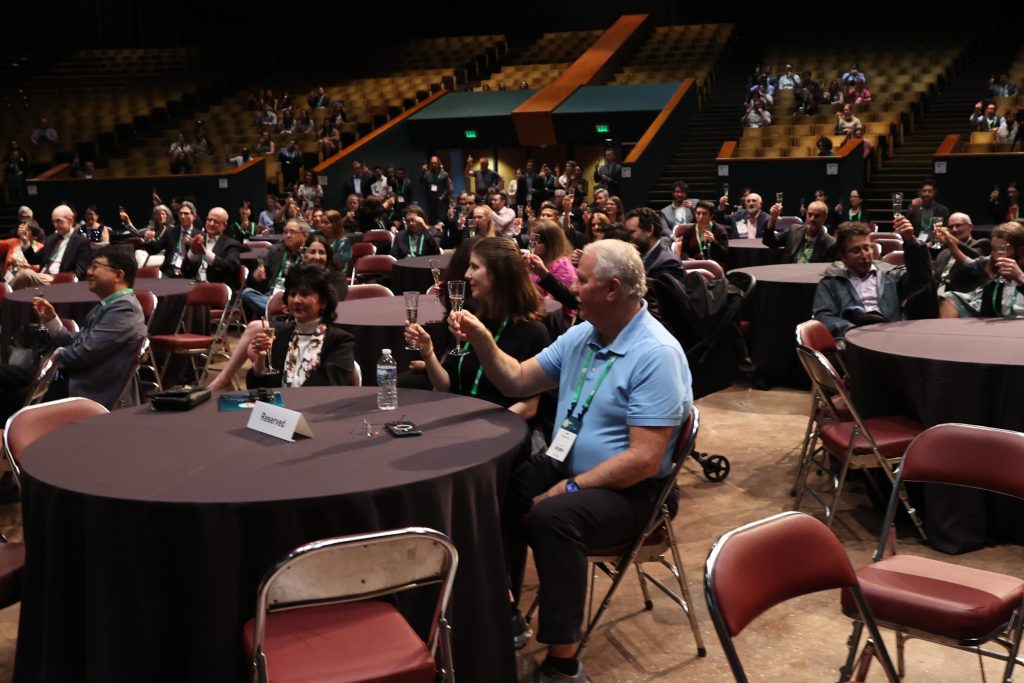
Delegates came together at a champagne reception to toast this year’s ACLP award winners. They included seven new FACLPs, previously featured in ACLP News here.
